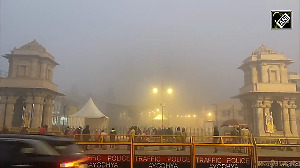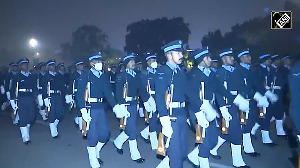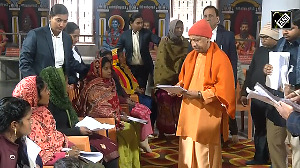It was a refreshing but frightening trip to Pakistan. It was heartening to note the optimism among people and politicians but disturbing to note the underlying fear of the worst. There is unmistaken concern about a creeping Talibanisation in Pakistan among its civil society and the political parties. People are unsure about which way the deal with the Taliban in Malakand and Swat will go.
I accompanied a 13-member delegation recently, before the attack on Sri Lankan players in Lahore, to Pakistan with veteran journalist Kuldip Nayar, who is immensely popular in Pakistan too. We got an opportunity to meet the political leaders of all major parties, business people, students, press and civil society. Although this was my sixth trip to Pakistan in as many years, it was a revelation to me that all major political parties there actually desire peace and friendship with India. It remains an enigma to me that two societies which feel emotionally so close to each other and are culturally entwined have managed to sustain animosity for 60 long years. And no sign of truce is in sight.
The people and politicians of Pakistan are seriously worried about the threat of Taliban taking over. People don't know whether human rights will remain preserved and the politicians don't know whether democracy, once again, will be eclipsed in Pakistan. The governments of the North West Frontier Province and Pakistan seem to have capitulated to the fundamentalists. The governments simply don't know how to tame the monster which it once helped create at the behest of the US. It is an irony that a sovereign state like Pakistan continues to be bombarded by US to target the militants and the government of Pakistan is a mute spectator.
The foreign minister of Pakistan, Shah Mehmood Qureshi, was pleading with the US authorities to hand over the control of unmanned aircrafts called 'drones to Pakistan instead of these attacks being engineered from the US. The dependence of Pakistan on the US government and its aid has eroded the economy and legitimacy of government in Pakistan. In spite of everybody in Pakistan realising that its association with US has created problems for itself, they find themselves in a bind. There doesn't seem to be a way out. It is also in the army's interest, which tends to dominate the civilian elected government, that the association with US continues so that it can continue to play this dominating role. The army projects itself as the sole counterbalancing force to the jehadis and hence will continue to play a role larger than that of the government so long as the threat of Taliban and Al Qaeda is looming large.
It is a known fact that militants have gained an upper hand during the military regime. Nawaz Sharif doesn't seem to remember any 'suicide bombers' during his time as prime minister. He is sceptical of the deal with the Taliban. He blames military directly for weakening democracy in Pakistan. He said that problem of terrorism originating from Pakistan doesn't affect India alone, it affects Pakistan much more.
In a meeting held in Benazir Bhutto's house with Asif Ali Zardari's sister Faryal Talpur, she mentioned that about 6000 people in Pakistan have died at the hands of jehadis. She said India was applying pressure on Pakistan to take action against the terrorists. But probably Pakistan needed India's help to put its house in order. Asfayandar Wali Khan, the grandson of Khan Abdul Gaffar Khan, and leader of the Awami National Party -- the party in power in the NWFP, articulated this sentiment as for India to feel safe a strong stable central government was required in Pakistan.
With military and intelligence soft towards the jehadis, if not completely hand in gloves with them, it will have to be the civilian elected government supported by the judiciary which will have to assert its supremacy over any other body -- state or non-state -- if normalcy is to be restored in Pakistan. This implies the democracy must take roots and flower to full bloom. It has been Pakistan's misfortune that democracy was strangulated time and again.
In this light the latest moves by President Asif Ali Zardari to finish off his political rival, Nawaz Sharif, easily the most popular mass leader in Pakistan today after Benazir Bhutto's assassination, are unfortunate. For democracy to remain firmly rooted the ruling party as well as the opposition must be strong. A healthy respect for other parties is must if democracy is to unfold in Pakistan in the interest of its people. Sharif's demand to reinstate the judges dismissed by former President Pervez Musharraf and to make the judiciary independent are politically very prudent demands. Zardari has reasons to fear an independent judiciary. He has made an amendment in the Constitution to remove the requirement of being a graduate to be made the President of Pakistan. This will be challenged as soon as judiciary is no longer under his control. But he must realise that if Pakistan's long term interest is his objective, then he may have to make some sacrifices to ensure that military never returns to centre-stage in Pakistani politics. The army has already issued him initial warnings.
It was heartening to hear Khurshid Kasuri, the foreign minister of Pakistan during Musharraf's regime, reveal that a solution to the Kashmir problem has probably been arrived at. No wonder, the recent elections in J&K passed off so peacefully and with a huge turnout by Indian standards. If it was not for the pro-democracy movement started by lawyers in Pakistan and then the elections there and now the impending elections in India, Manmohan Singh was due to visit Pakistan to announce this to the world. If a solution to Kashmir imbroglio is found to the satisfaction of the Indians, Pakistanis and most importantly the Kashmiris, it'll pave the way for a more permanent peaceful relationship between the India and Pakistan.
Indian will have to work with the elected government of Pakistan to deal with the advancing menace of Taliban. As one TV anchor pointed out while we were in a talk show in Islamabad, all attacks on India in its long history have taken place from its north-western border. Hence we must not take the threat of Taliban lightly or consider it only as Pakistan's problem.
Courtesy: Telhelka.com
Dr Sandeep Pandey, a Magsasay award winner, was part of an Indian delegation that visited Pakistan recently.






 © 2025 Rediff.com -
© 2025 Rediff.com -